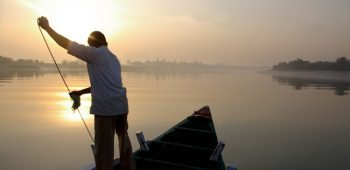
ANOKHI takes a literary exploration of the wonders of India
Sometimes the best holiday is no further than a comfortable armchair–skip waiting in long lines at the airport and curl up with a good book for an instant vacation. Travel guidebooks sell the tourist sights but miss the details that explain everyday life–for that behind-the-scenes perspective, a novel is the best solution. Fictional and non-fictional Indian literature enjoys a long history of fascinating tales, and the following reads by some of the subcontinent’s most celebrated writers offer great glimpses into the past and present of the country’s most visited destinations.
Regions: Delhi
The Last Mughal
The Eclipse of a Dynasty, Delhi 1857 – William Dalrymple
Over the past decade, founder and co-director of the Jaipur Literature Festival, William Dalyrmple, has written five critically acclaimed books about India. In three of these books–City of Djinns, White Mughals and The Last Mughal–Delhi takes centre stage. The Last Mughal, the author’s latest, focuses on Bahadur Shah Zafar, the titular leader of much reduced empire. Dalyrmple paints a fascinating portrait of a cosmopolitan capital while giving a crash course on the Sepoy Mutiny, the rebellion that almost overthrew the British Raj.
Regions: Kalimpong and Darjeeling
The Inheritance of Loss – Kiran Desai
Desai won the 2006 Man Booker prize with this, her sophomore effort. The novel chronicles the lives of Jemubhai Popatlal, a retired Cambridge-educated judge, his orphaned granddaughter, Sai, his cook and the cook’s son Biju against the backdrop of Maoist agitation in Nepal. The action alternates between New York and Kalimpong, a hill station near Darjeeling, and includes lyrical descriptions of the fading glory of tea plantation life.
Regions: The Sunderbans, West Bengal
The Hungry Tide – Amitav Ghosh
In recent years, every publication from the The New Yorker to the London Telegraph has recommended the Sunderbans to travellers. It is easy to see why–the light in the archipelago is such that mystery and the mystical seem to touch everyday life. Ghosh’s novel is multi-textured in the same way–weaving descriptions of the islands, historical facts, stories from local mythology and the fictional quest of Piyali Roy, an Indian-American marine biologist, for the once-plentiful Irrawaddy dolphin.
Regions: Mumbai
Maximum City: Bombay Lost and Found – Suketu Mehta
Mehta returns to Mumbai after a 20-year absence and his book is an exploration of the changes he found covering a range of topics from Bollywood to communal violence. Maximum City is sometimes a gritty read–Mehta interviews sex workers, crooked cops and murderers– but at times it is also hilarious–see the diary on the filming of Mission Kashmir. Other great books about Mumbai include: Rohinton Mistry’s A Fine Balance, which follows a Parsi family and provides great insight into that community; and Bollywood Nights, a sensational page-turner by Shobhaa Dé, India’s answer to Jackie Collins.

Humayun's Tomb is one of the many Mughal monuments of Delhi. For another view of Mughal Delhi check out William Dalyrmple's books.
Regions: India-wide
The Discovery of India –Jawaharlal Nehru
India’s first prime minister wrote thousands of letters from 1942 to 1946 to his daughter, future prime minister Indira Gandhi, while in jail for civil disobedience and sedition. Selected letters covering Indian history and culture from pre-history to the British Empire from a nationalist point of view were published in 1946, and the book became an instant classic.
Regions: Kerala
The God of Small Things – Arundhati Roy
Roy received the 1997 Booker Prize for this work and has spent much of the past decade in political activism fighting against the Narmada Dam Project. This semi-autobiographical novel is also politically-charged and is set in 1960s Kerala, where communism and tradition–both of the Hindu caste system and of Keralite Syrian Christianity–collided. The plot is a family saga with as many twists as the typical soap opera, but Roy’s descriptions lift the book into the literary stratosphere.

Buddhas at the ancient cave temples of Ajanta; see Nehru's The Discovery of India for a quick history lesson.
Regions: West Bengal
Chokher Bali – Rabindranath Tagore
South Asia’s first Nobel laureate and nationalist author Rabindranath Tagore is still revered in his native Bengal, especially his hometown of Kolkata. Two of his poems became the national anthems of India and Bangladesh, but the rest of his equally lyrical work is also worth a read. His poems, plays and novels blend philosophy and descriptions of the common man. Chokher Bali or Sand of the Eye deals with the topic of widow remarriage against the backdrop of the Independence struggle. Rituparno Ghosh directed a movie version of the novel in 2003 starring Aishwarya Rai-Bachchan.
WORDS & PHOTOS RITIKA NANDKEOLYAR














































































































